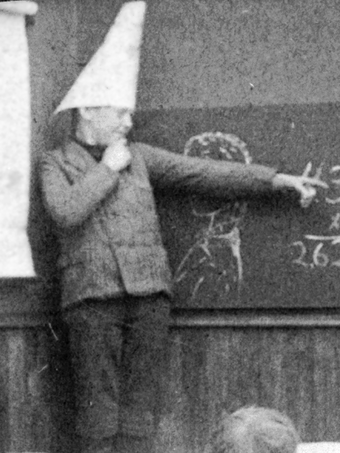Chris Powell: Only obnoxious students justify teacher raises now; justice system runs on sometimes dubious plea bargains
Young student wearing dunce hat as punishment in 1906 photo
Latch-key kid of parents who aren’t home
MANCHESTER, Conn.
Student performance continues to crash in schools in Connecticut and throughout the country. The results of the latest National Assessment of Educational Progress tests showed steep declines in the reading and math proficiency of 13-year-olds. Students are doing worse than a decade ago.
But as usual there is much clamor to increase compensation for teachers, to hire more teaching assistants, and to keep increasing spending on schools even as enrollment keeps falling.
The enduring gap between school spending and student performance should have destroyed by now Connecticut's longstanding presumption that spending equals education. But the presumption is sustained by the influence of the presumption's main beneficiaries -- members of teacher unions -- and by the public's not wanting to acknowledge education's decline. For doing so might lead to other troubling realizations.
One such troubling realization would be that teacher pay has to keep being raised not because teachers are successful but because students are making their jobs insufferable.
Teachers are leaving the profession and recruiting good candidates for teaching jobs is a struggle because many more students arrive in school ignorant of the basics they once learned at home and because many others seriously misbehave, even violently, or are chronically absent.
In these circumstances even the best teachers can't get good results, and even the worst teachers may be considered essential because there are no replacements.
For similar reasons police work in Connecticut also faces a staffing problem, especially in the cities. Who wants to "serve and protect" when the work is less appreciated and more dangerous?
xxx
Everywhere more people are behaving badly and seem full of rage -- not just on the road and in politics but in ordinary life as well. Hence, for example, Connecticut state government’s decision to allow municipalities to install "red light cameras" where motorist misconduct is worst.
Few people in authority acknowledge what is going on. Those who do sense that something is seriously wrong attribute it to the disruptions of the recent virus epidemic. While government's main responses to the epidemic were indeed mistaken and damaging -- school and commercial shutdowns and near-compulsory submission to inadequately tested vaccines -- the bad trends, including educational decline, were in place long before the epidemic. Signs of social disintegration are almost everywhere.
Everything starts with children. So where are all the messed-up kids coming from? Government isn't asking.
Throwing more money at teachers and police, as Connecticut is doing, may keep them on the job a while longer but it doesn’t answer the question and won’t make their jobs easier.
Southport, Conn.-based Sturm, Ruger & Co.’s MK II 22/45 target pistol. Despite the departures in recent decades from a state that used to be famous for firearms manufacturing, several major gun makers still retain a presence in Connecticut, including Sturm, Ruger; Colt, Charter Arms and Mossberg.
Maybe there is a hint about social disintegration in a recent study by the state Office of Legislative Research, analyzed last monthby Marc E. Fitch of the {conservative} Yankee Institute's Connecticut Inside Investigator.
The study tends to confirm complaints made in February by city mayors and police officials that since gun crime in Connecticut is committed disproportionately by repeat offenders, prosecutors and courts aren't taking gun crime seriously enough.
The OLR study found that from 2013 through 2022 two-thirds of gun-related criminal charges brought by police in Connecticut were dropped, usually as part of plea bargains gaining convictions on charges considered more serious.
The criminal-justice system runs on plea bargaining, so when most crimes get to court they are "discounted." While some arrests may involve "overcharging" by police -- adding charges that are more or less redundant -- a gun charge can be redundant only if the state thinks, for example, that it doesn't matter much if an assault or a robbery was committed with a gun as long as a conviction for assault or robbery can be achieved.
Of course, if state policy considered a gun offense to be just as serious as an assault or robbery, or even more so, and demanded that it be prosecuted just as seriously, and if conviction on a gun charge carried a mandatory long prison sentence, gun crime might diminish substantially.
Instead state legislators keep passing laws to impede gun ownership by the law-abiding and then boast about reducing the prison population even as repeat offenders, including gun criminals, remain free.
Chris Powell has written about Connecticut government and politics for many years. (CPowell@cox.net).


